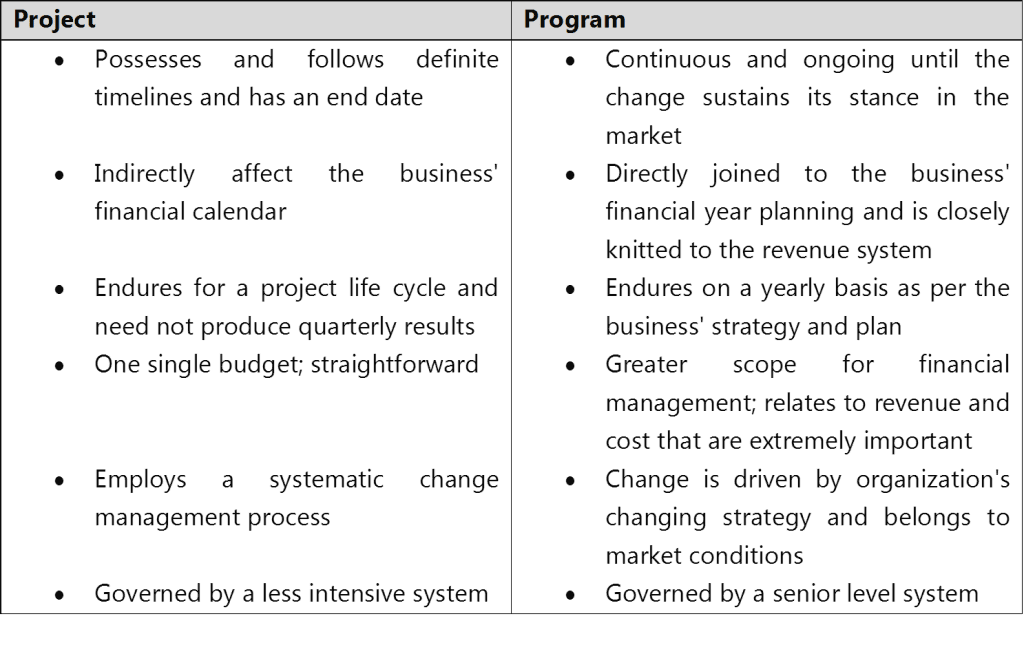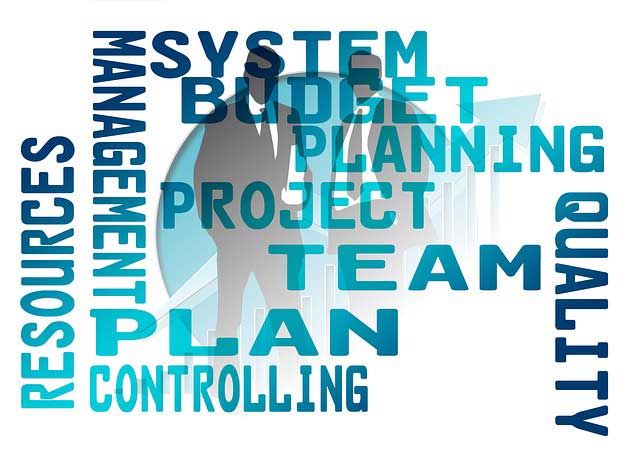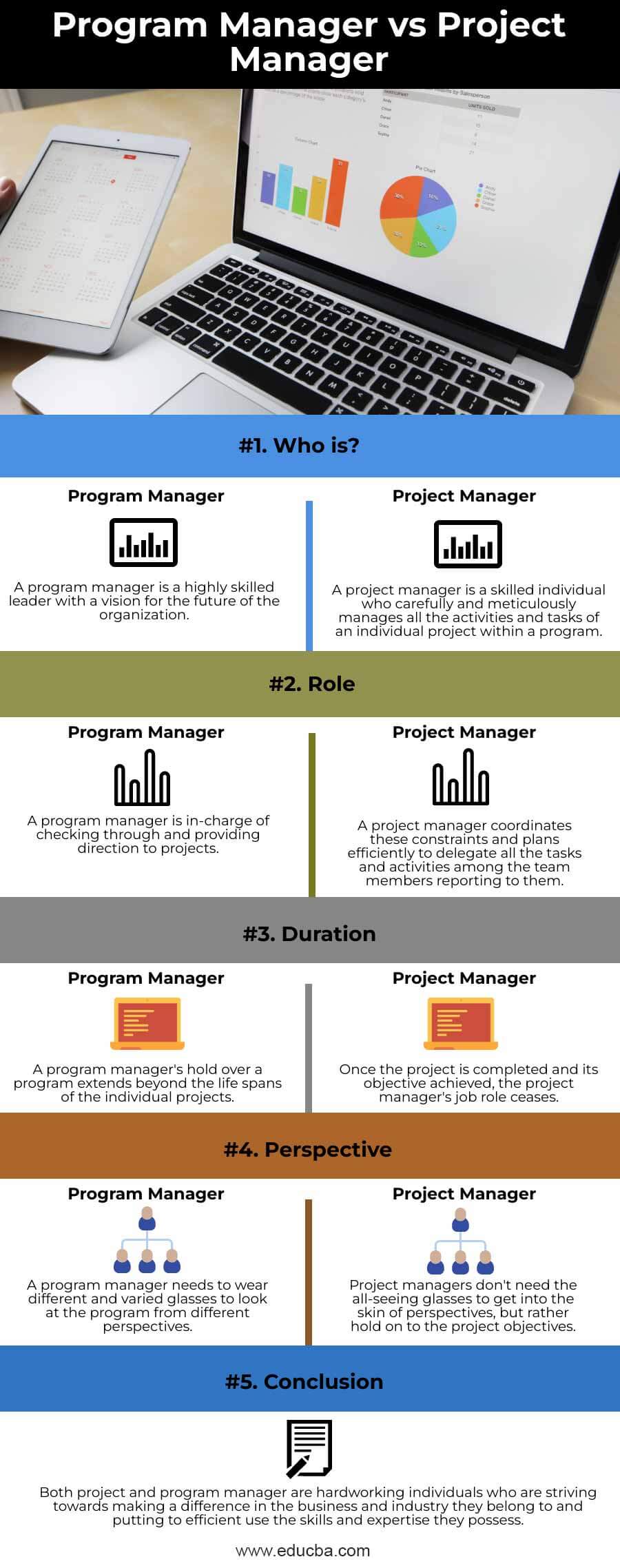Updated June 8, 2023

Difference Between Program Manager vs Project Manager
Program Manager vs Project Manager- Confused between these project management roles? Two highly prolific functions fulfilling the void between projects and people, these managerial posts are gaining momentum in the corporate world like no other. With a skill set to boast of, many organizations deal with project and program managers, but many still use the terms interchangeably, and sometimes, this causes quite a stir. Knowing the difference is vital as a designation is equally essential to the job. This article will give you the Program Manager vs Project Manager and help you understand what makes them uniquely and distinctively different. Welcome to the worlds of program and project management.
Each organization’s business objective comes across as the direction the business wants to head. Programs and projects aid these schemes to get the company to fulfill its desired position in the corporate world.
Segregation of tasks and activities and chunking always provide relief and better monitoring opportunities for managers, thus, creating teams to manage and coordinate each segregation. This gives rise to programs and projects among these teams. To comprehend Program Manager vs Project Manager, you must understand the stark difference between a program and a project.
What’s a Project?
This article describes a project as a temporary endeavor undertaken by a team or teams to bring about a specific change within a department or organization. Projects come with constraints such as cost, scope, timelines, and resources and undergo a project life cycle, which comprises phases such as:
- Defining
- Planning and designing
- Developing and executing
- Monitoring, evaluating, and closing
Projects can focus on processes, people, or procedures and aim to resolve problems or issues that hinder the workflow’s proper functioning.
Every organization and undertaking needs order and systematic approaches to yield desired results for the objective. Project stakeholders are members interested in this result and are responsible for the decision taken around the constraints posed by the project. Project team members are the hands of the project and are the crew working directly on the project, striving to help the project meet its primary objective.
One should not mistake projects for small changes implemented within the company’s workflow; instead, projects should be an undertaking that contributes to a significant difference within the organization’s system. A project manager handles a project.
What’s a Program?
Interestingly enough, a program is usually the term used to mention a collection of projects aimed at achieving the overall goal of the company and business objectives, and those that are dependent on each other for success.
Programs are significant undertakings and cannot be supervised by a central figure. To manage the program well, delegating individual projects stemming from a single program is recommended. This eventually cumulates into a program having many underlying projects. A program manager deals with the nuances of a program.
The few phases that take place in a program are as follows:
- Outlining objectives
- Planning execution
- Managing operations
- Reporting
All of these phases and stages are conducted to beautifully coordinate the many projects in line to achieve the goal set by the program, which intends to bring about dramatic changes in the business performance altogether.
A program provides a high-level view of the projects that work towards achieving the business objectives.
Let’s have a look at this table to get a little more definite difference between the two management systems:

Who is a Project Manager?
A skilled individual who carefully and meticulously manages all the activities and tasks of an individual project within a program. A project manager carefully manages the triple constraints involved in project management: cost, scope, and timelines.
A project manager coordinates these constraints and plans efficiently to delegate all the tasks and activities among the team members reporting to them. While a project manager reports to a program manager, who is in charge of checking through and providing direction to projects, project managers are also responsible for managing the project’s progress to completion. Project teams update the program manager about any changes or deviations from the initial project plan.
The project manager stays on duty for as long as the project life span. Once the project is completed and its objective achieved, the project manager’s job role ceases, and they can latch on to the next project at hand, review the workflow processes, or check on what didn’t work the first time around.
Who is a Program Manager?
A program manager possesses high-level leadership skills and a vision for the organization’s future. They ensure that the program’s overall vision is achieved, serving as the official supervisor and mentor for the individual projects undertaken to benefit the program.
The program manager must understand the change program required for the business’ performance and then map and define the list of projects necessary to achieve the program’s objectives.
The program manager would need to correctly and accurately brief the project managers on the business objective to be achieved, which can benefit the business regarding the revenue and returns accrued.
Regarding the program, program managers focus on the strategy applied and the implementation plan. Then accordingly, the delegation of projects as per the requirement takes place.
A program manager’s hold over a program extends beyond the life spans of the individual projects and goes on to the program’s long-term benefits.
Managing such programs demand long-term commitment by the program manager. The program results are in conjunction with the quarterly business plan; a program manager is responsible for that.
In monitoring and maintenance, a program manager will ensure that the governance board provides realistic goals for the change program and is responsible for achieving them.
Head-to-Head Difference Between Program Manager vs Project Manager (Infographics)
Below infographics on Program Manager vs Project Manager throws light on significant differences between the two.
It is often said and believed that program managers possess more excellent skills and power in their role and utilize these abilities to make a significant impact.
More than an enormous hat, a program manager must wear different and varied glasses to view the program from different perspectives. Through these perspectives arise the proper segregation of projects to achieve the business objective set for that particular program.
Once these perspectives are set and the segregation made, the role of project managers becomes prevalent. Project managers don’t need the all-seeing glasses to get into the skin of perspectives but rather hold on to the project objectives and manage the process and workflow that culminate in the project’s success.
To gain a more in-depth understanding of the Program Manager vs Project Manager, let’s have a quick look into each of these perspectives:
1. Tactical Approach versus Strategic Approach
With the comparison between program and project managers, it is safe to say that a project manager is more tactical than a program manager. At the same time, a program manager has a strategic role.
The role of a project manager centers on completing tasks, delivering results, and meeting expectations and quality standards. The project manager also strives to meet specifications on time and within a slated budget.
The role of a program manager focuses on the bigger picture, that of the implementation and complete fulfillment of the strategy employed to provide more significant gains to the business. Growth, results, and business performance are the central attractions of a program manager.
2. Project versus Operations
As stated in this article, a stark difference between a project manager and a program manager is that once a project achieves its end date with success, the project manager’s work is said to be completed.
In such a scenario, a program will continue to look beyond the end dates of individual projects and check for operational tasks and change transition.
A project manager will look at each activity from a transactional point of view and doesn’t involve the bigger picture of business results.
A program manager will think from a businessperson’s perspective and look for business results and outputs in every task or activity.
3. Engineering versus Architecture
A direct analogy of this point is to compare project managers to engineers, who primarily plan and execute a set plan for the project’s benefit.
Program managers, more like architects, work on designing the entire undertaking and checking for feasibility and adaptability of a particular design in a business environment. These program managers look at the following:
- Form
- Function
- Design
This is just the case for architects. These elements encapsulate the vision when worked upon during the program proceedings. These professionals will select effective solutions, delegate projects that work harmoniously with the change program’s aim, and check for structural dependencies to facilitate the smooth functioning of each project, which will ultimately sum up to the program being deployed. All these together help the program to achieve optimum results in the long run.
4. Coordination and Management versus Vision and Leadership
The difference between management and leadership is that management gets to the nitty-gritty of processes and people and deals with transactional activities. In contrast, leadership always invites and inspires people with goals and visions to complete a particular objective.
A project manager may use leadership qualities to inspire team members to conduct their work. This contribution will help them assemble a smashing project and accolades for the team. In a project, the project manager focuses primarily on completing tasks and delivering results within the allotted time frame and budget rather than on instances of leadership.
On the other hand, program managers check for the operations conducted, and project managers report to them; they also put in front of these project managers the program’s vision and how projects can benefit the program and, the program, the business. Program managers are responsible for motivating and inspiring individuals and the stakeholders in the program to envision the dream of the change program and urge them to turn the dream into a reality.
Program managers are visionaries to the business and have a distinctive leadership air.
Having reached the end of this topic, enlisting one similarity between project and program managers comes to mind. They are both hardworking individuals striving towards making a difference in the business and industry they belong to and using the skills and expertise they possess to use.
I hope you enjoyed reading this article and that it inspired you to aspire to become a project or a program manager. Businesses worldwide are searching for individuals who can bear the responsibility and accountability of improving business performance and, in turn, changing the global economic scene.
Click the Share button to spread the good news of project and program management, and hit the Like button to show us your love. Stay inspired!
Recommended Articles
This is a guide to Program Manager vs Project Manager. Here we have discussed the basic concept, with head to head difference between Program Manager vs Project Manager, along with infographics. You may look at the following articles to learn more –






